Table of Contents[Hide][Show]
High blood sugar in the morning is a popular topic – it seems to stump many people.
For instance, a while back I had a client sending me her blood sugar charts every few days and on those charts she always made some notes if she had questions.
Every time she sent them through, I noticed she had 3 big question marks (???) against her morning readings. And on another morning when her morning blood sugar levels were high at 160 mg/dl (or 8.9 mmol/l).
She had written:
I don’t understand. 97 mg/dl (or 5.5mmol/l) last night when I went to sleep. I didn’t eat anything because I didn’t feel well. Humm…
Here on the DMP blog we often receive comments like:
- Why is my reading in the morning higher than when I go to sleep?
- My morning numbers are always high no matter what I do. When I say high I mean 190. I am so frustrated and don’t understand why.
- Why does my blood glucose spike in my sleep giving me a high reading in the morning when I watch all I eat at dinner time?
Do these morning situations sound familiar to you? Are you constantly questioning why you have high blood sugar in the morning?
Logically we’d think that it should be at its lowest in the morning, right?
Well don’t panic, there is a reason for it, so let’s explore why morning blood sugar is often higher. And then we’ll discuss what you can do to help lower blood sugar in the morning.
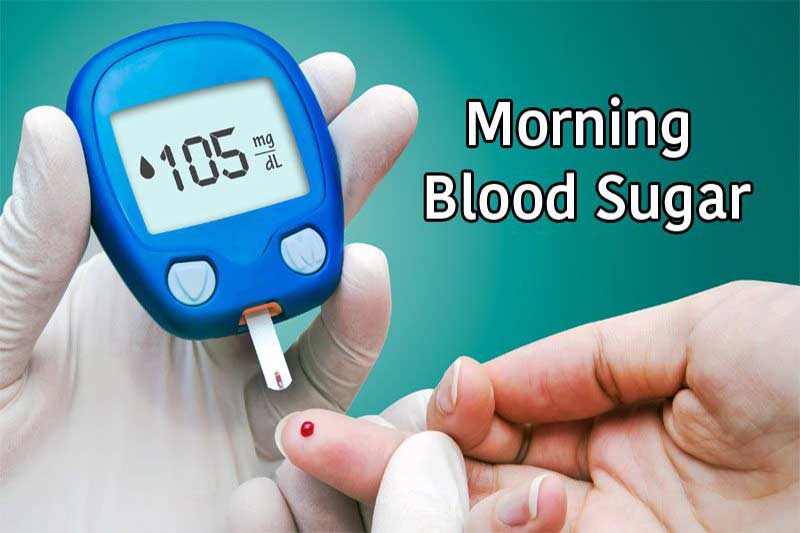
Why Is Blood Sugar High In The Morning?
Although it would seem logical that your body would have the lowest blood glucose level in the morning, this often isn’t the case for the following 6 reasons.
1. Glucose Happens 24/7
All the cells in the body need glucose to fuel their function, even when we sleep.
Therefore the liver can produce sugar (glucose) by breaking down body stores (glycogen), a process called glycogenolysis. The liver can also manufacture sugar (glucose) from amino acids (proteins) in a process called gluconeogenesis.
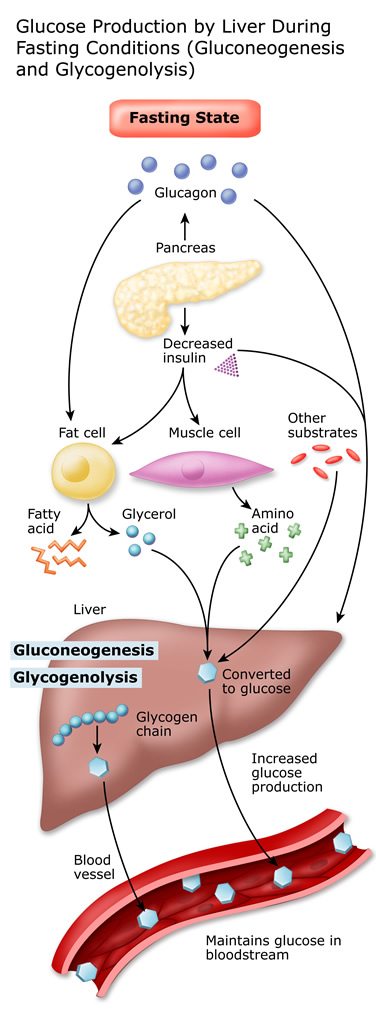
Image courtesy: University of California
These processes ensure the body and brain have adequate fuel so they can continue to go about their functions.
The point is: glucose production in the body will still occur when you don’t eat or if you skip a meal because the body always maintains glucose at a certain level in order to function.
2. Hormones Raise Blood Glucose (the Dawn Phenomenon)
Around 3-4 am each morning, there are a collection of counter regulatory hormones that are signaled in the body: glucagon, epinephrine, growth hormone, and cortisol, which result in a rise in blood sugar.
This change in hormones occurs to stimulate our awakening, to get us moving and to give us energy. This is referred to as the Dawn Phenomenon or Dawn Effect.
This is in fact a ‘normal’ response. This occurs in everyone, diabetic or not.
However, if you have diabetes or prediabetes there is one additional factor that impacts both the overnight glucose production and the rise in glucose with cortisol, and that is decreased insulin production or decreased utilization of insulin.
3. Decreased Insulin Production or Utilization of Insulin
Because most people with type 2 diabetes and prediabetes have either decreased insulin levels or decreased utilization of insulin, there is either not enough insulin being produced to bring the rising blood sugar levels down, even during the night when you are sleeping.
In this scenario, your body is still producing glucose, your hormones are still doing their thing, but insulin production is low so your body is unable to couteract the effects of the glucose and hormone change.
The other scenario is that your levels of insulin resistance are preventing effective utilization of insulin, which results in high levels. You may be producing sufficient insulin, even during the night, but your cells are not opening in response to insulin, therefore glucose remains in the bloodstream.
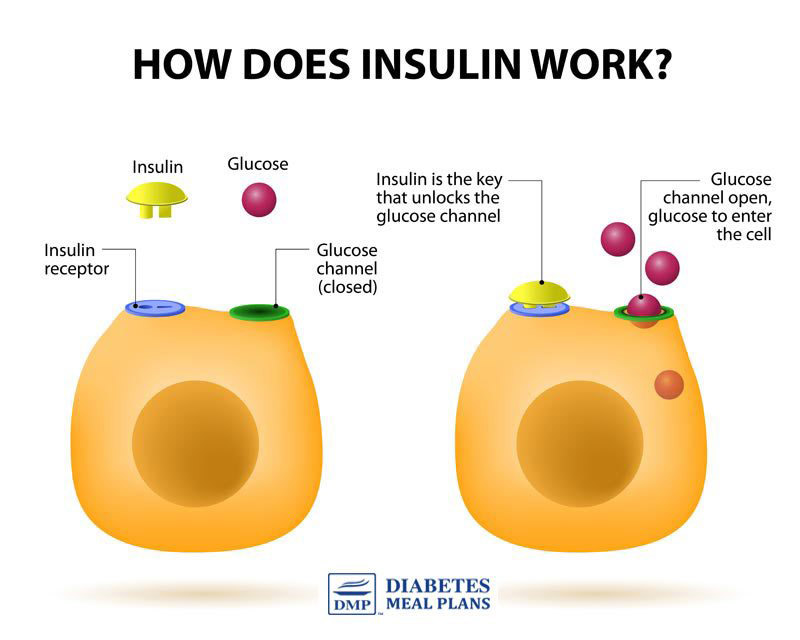
4. Hypoglycemia known as the Somogyi Effect
This is less common but in some people with diabetes, low blood sugar (hypoglycemia) can occur while you are sleeping.
The Somogyi effect is more common in diabetics who are insulin dependent. It’s when your body’s glucose levels decrease quite significantly overnight (nocturnal hypoglycemia) and as a result your emergency system is activated. This sends messages to your hormones and organs to stimulate more glucose production to help raise your levels.
If you’re insulin dependent and trying to identify why your blood sugar is so high in the morning, you might want to wake yourself up during the night to test your levels, just in case this might be your situation and your insulin dose needs to be adjusted, for instance, implementing a long-acting insulin. Or in some cases, people may choose to use a continuous insulin pump.
You can read more about the Somogyi effect here.
5. Poor Food Choices
Poor food choices has a profound impact on your blood glucose and A1c levels, and therefore your early morning levels too.
Regardless of the time of day, poor food choices will impact your glucose levels negatively.
Your goal is to clean up your diet, and stick to eating recommended foods that support good blood sugar control.
6. Poor Overall Glucose Control
If your daily averages are coming in well above the normal healthy range for blood sugar levels, chances are your fasting levels are going to be high as well.
Good blood sugar control means keeping your blood sugar levels as close to normal as possible. And if you can keep them within the healthy range, that’s even better.
You need to know your numbers…
Aim for fasting levels:
- Between 70-100 mg/dL or 4-5.6 mmol/l (optimal)
- 70-110 mg/dL or 4-6 mmol/l (considered good control)
- 70-130 mg/dL or 4-7.2 mmol/l (more liberal, but realistic for many)
- 2 hrs post meal the ideal is under 140 mg/dl or 7.8 mmol/l – the lower your postprandial blood glucose is post meal (for instance 120/ 6.7), the better.
There is some variation in numbers worldwide and your physician may also set you more stringent goals, or more lenient goals.
The point is: keep an eye on your numbers. If you’ve constantly got numbers that are running high during the day, chances are they are going to be even higher in the mornings.
Your goal is to bring your blood sugar levels within a healthy range, then naturally the morning levels do come down as well.
Still, even when you have good control of your daily levels, those morning numbers may still be a little high.
So what can you do? Let’s look at some proven strategies.
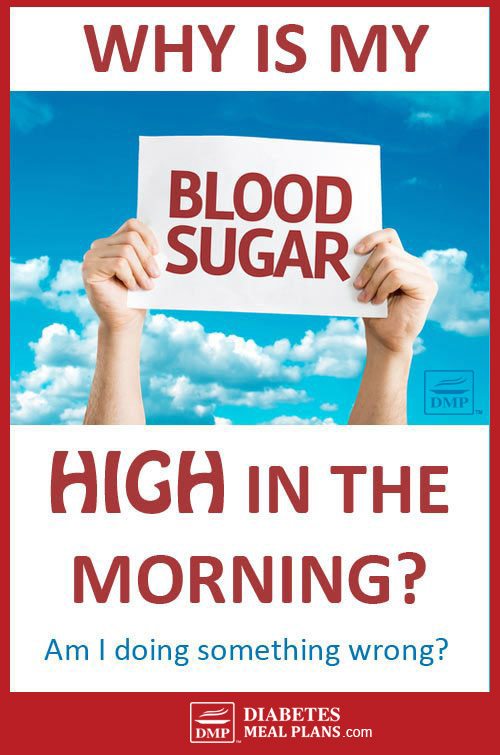
Lifestyle Strategies To Lower Morning Blood Sugar Levels
The truth is, that despite the fact we know the Dawn Phenomenon exists, and worsens morning blood sugar in those with diabetes and prediabetes, researchers still haven’t solved exactly how to lower morning levels.
However, try some of the following methods to see if they work for you. Every person is different and while there is no one proven method for lowering morning levels, many people do report one, or a combination of the following helps.
Apple Cider Vinegar & Cheese Before Bed
One small study found that having 2 tablespoons of apple cider vinegar with 1 oz (28 g) cheese (which is just 1 slice cheese) before bed may help reduce morning glucose by 4% to 6%.
Cheese on it’s own may reduce it by 2% but the acetic acid in the vinegar exerts additional positive influence. The best apple cider vinegar to use is this one by Braggs. If you can’t stomach the vinegar, you can also purchase capsules. As for best cheese, cheddar is one of the best choices here, though you could try other options if you wish.
*NOTE: this tip alone is proving to help many people.
TESTIMONIALS:
“After 2 Tbsp apple cider vinegar & 1 oz cheese last night, my FBS in the morning is 98. It works!” ~Dianne
“I tried the vinegar and cheese before bed. It actually worked. My fasting reading was lower this morning. Thanks!” ~Michelle
Try it yourself: 2 tablespoons of apple cider vinegar (mixed in some water) with 1 oz (28 g) cheese (which is just 1 slice cheese) before bed.

Have a Bedtime Snack
The best type of snack is a protein/fat snack combined, not something high in carbs.
Here are a few ideas:
- A tablespoon of natural peanut butter (great on pieces of celery for some fiber filling goodness)
- A small piece of chicken with avocado or 5 olives
- A small handful of macadamia nuts
- A couple of slices of cheese
Sleep Soundly
Make sure you get a good restful sleep every day because lack of sleep can increase cortisol production (your key stress hormone) and this pushes glucose levels higher. Sleep quality has a big influence on blood sugar levels.
Avoid Alcohol
Although drinking alcohol might seem relaxing it is best to steer clear of it because it’s actually a stimulant and prevents deep REM sleep.
Eat Protein In The Morning
To help bring blood sugar levels down, eat something when you get up but make sure it’s a protein – or a balanced protien/fat/veggie breakfast such as a mixed veggie egg scramble.
If you go and eat loads of carbs for breakfast when your blood glucose is already high, it will only push it up further. The message here is: toast and cereals are often the worst offenders.
Eat Well Every Day
Morning blood sugar levels are all tied up with everything else you do throughout the day.
And one of the best ways to to manage your diabetes or prediabetes is to eat a healthy diet every day – eat the right type of carbs, eat the right amount of carbs, and minimize the most problematic foods – the high carb offenders: sugar, bread, rice, pasta, cereals, and potatoes.
The food you eat has a direct impact on your blood sugar and A1c levels. And the more controlled you can keep your blood sugars overall, the better your morning sugars will be as well.
You’ll find plenty of diet resources on our website. And if you need further help, consider joining as a member.
Supplements to Help Lower Morning Blood Sugar Levels
A variety of supplements have been shown to be effective in reducing fasting glucose levels.
Cinnamon
The average results from two months of cinnamon supplementation at about 3g/day is a reduction in fasting blood glucose by 11.8 mg/dl (0.66 mmol/l).
Polyphenols in cinnamon provide many benefits such as enhancing insulin signaling, improving glucose transport into cells, and reducing insulin resistance.
Chromium
A review of chromium supplementation found that fasting blood glucose can be reduced by 9 mg/dl (0.5 mmol/l) to 31 (1.72 mmol/l).
Researchers suggest this is due to enhancement of insulin action.
Garlic
Taking approximately 300 mg of garlic powder for 8-24 weeks has been shown to reduce fasting blood glucose by approximately 35.8 mg/dl (2 mmol/l).
Researchers suggest garlic helps enhance insulin sensitivity, exerts insulin-like activity, enhances pancreatic beta cell function and inhibits carbohydrate metabolism.
L-Carnosine
L-carnosine 1000 mg per day for 12 weeks showed a 13.1 mg/dL (0.7 mmol/l) reduction in fasting blood glucose levels.
L-carnosine is naturally found in muscle tissue and when taken as a supplement helps modify glucose metabolism, provides antioxidant, protects against glycation and reduces inflammation.
Aloe Vera
A review of aloe vera found a reduction in fasting glucose levels by 46.6 mg/dL (2.6 mmol/l). Aloe vera was either taken by supplement 50-300 mg per day, or juice 15 – 30 mL.
Although the exact mechanisms are unclear, proposed mechanisms include the expression of the genes related to glucose metabolism and reduced insulin resistance. Aloe vera contains over 75 active components, some of which are trace elements of chromium, magnesium, manganese, and zinc that are important in the metabolism of glucose.
Berberine
The effects of berberine on fasting blood sugar levels is very impressive. When people with type 2 diabetes were given 500 mg of berberine per day, 3 times per day, for 13 weeks, fasting blood glucose reduced by 68 mg/dL (3.78 mmol/l).
Berberine has many potent glucose-lowering properties. If you’d like to learn more about it, we’ve written about berberine extensively over here.
Many of the above supplements have also been shown to control blood sugar overall, along with lowering A1c, as well as providing several other benefits.
The best rule of thumb here is not to go out and take every single supplement, but try taking one supplement for a time and see if it exerts any benefits for you. If not you can try exchanging it for another one to evaluate its effects.
Always be aware that any blood sugar lowering supplements can potentially cause low blood sugar (hypoglycemia). You should always seek medical advice before supplementing, especially if taking medications.
Please pin, tweet or share; then keep on reading – thanks!
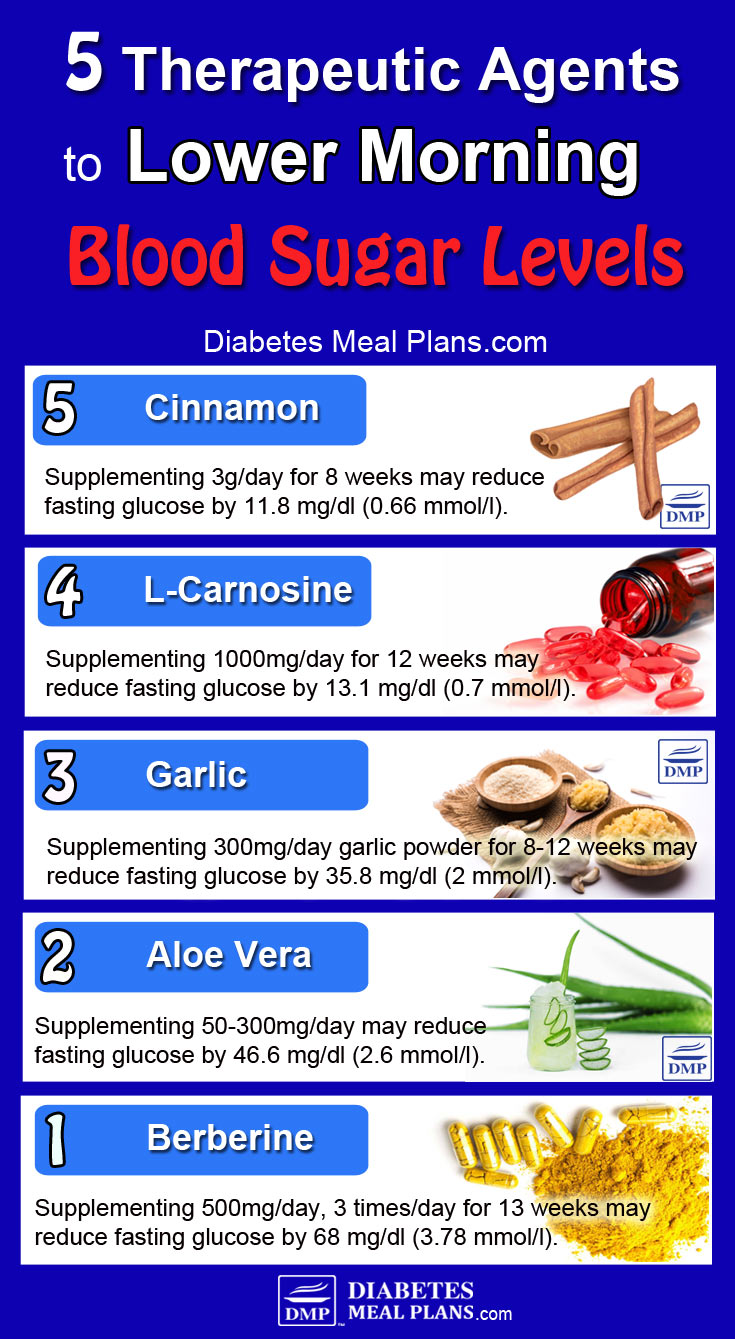
Conclusion
Unfortunately there is no one size fits all solution to solve the high blood sugar in the morning dilemma. Sometimes people can do everything possible and still have morning levels that always come in a little high.
Hopefully in the near future, researchers will uncover a way we can solve the issue more permanently. But in the meantime, the best thing you can do is bring your daily levels down within a healthy range and maintain them there, as this will also influence morning levels.
Second to that you can try some of the strategies above to see if they make a difference for you.
If you’ve found something specific that works for you, please share in the comments below so others can try your tips, too!
YOUR TASK: 21 Day Lower Blood Sugar Challenge™
- Re-evaluate your blood sugar goals – you may already be within the healthy range, and that’s great – keep up the great work so you can keep them there! If you’re not, continue to work toward making diet and lifestyle changes because the more you can regulate your daily levels, the higher chance you have of your fasting levels coming within range.
- Implement some strategies – one of the most useful strategies to lower morning levels is to take apple cider vinegar with cheese at bedtime. We’ve seen this work well for many people. And even participants in the challenge have been trying it with success. See the details above on how to take it.
Commit to yourself and apply what we share because we know what we share can help you get results.
Not part of the challenge?
Want more blood sugar friendly information? Click Here to Subscribe – we’ll keep in touch with nutrition tips, recipes and health updates.Please pin, tweet or share this info to help others – thanks!
TESTIMONIAL: “I used your program after I found out I was Type 2. It has been over a year and with your program and the great information in it, I have been able to keep my A1C at a 6 – it started out around 9.5! Thanks for all your help.” ~Joann B, DMP Member


Now that my email is FINALLY working, I can check in! I’m going to try the apple cider vinegar tonight and see what happens. It is really difficult to figure out why sometimes my numbers are higher than others when my prescription for test strips is to check twice weekly.
Stick to the guidelines Rosie and you’ll likely see the patterns changing, even though you’re only testing twice a week.
You guys are a God sent, Thanks so much for the information 😊
As I get dehydrated overnight, I wonder if that wouldn’t push my FG up a bit. Generally, when I wake up, I drink a half liter of water and then measure about 30 minutes later, but before I eat anything. This keeps me in the 90’s.
Am I cheating?
Goblush,
That is not cheating at all! It is important to stay hydrated to keep your blood sugar in control. Try making sure you drink enough throughout the day so you are not playing catch up in the morning.
Fbs 143, pp 152.
Dinner lettuce wrap with 2.5 oz fresh turkey breast & mayo, 2 each carrots/celery sticks, 5 olives.
Thanks for checking in Miriam.
Can I use ground cinnamon instead
Hi Barb, you can use ground cinnamon. The study we are referring to in this article used 3g of cinnamon per day which is a little over a teaspoon of ground cinnamon.
HI this is liz checking in. Today my fasting number was 97.I am trying out some new recipes. I love to cook and try new foods. For breakfast today I tried something really different. I am trying to incorporate more veggies into my meal plan so I layered a
Breakfast casserole with zucchini, cheese,ham,and eggs. It very good and very diabetic friendly. Oh and I baked in the oven for 25 minutes.
Delish – Thanks for checking in Liz!
hi! sometimes i have high blood sugar 130-180 in the morning but this is not constant process. i don’t know what is this dawn effect or other thing because it does not happen all the time. sometimes when i check my sugar at 3am it is low and i have snacks but sometimes it is high such as 138, any ideas what to do? or what is this?
Hi Katie,
I would revisit the strategies mentioned in the article. There are numerous reasons it could be high sometimes- sleep habits, stress, and of course, what you ate that evening.
Hello,
I am getting extremely frustrated as I am on januvia 100ml every morning and once a week ozempic .25 – I am not overweight, I am physically fit, exercise 5x a week. I have been pre-diabetic
Since age 60 and now at age 70 I am diabetic. I eat very low carbs, no sugar, bread, pasta, potatoes or rice. My last A1C was 6.2 and my morning blood sugars are usually 127-160 – during the day 127-147 . I hear about all these people getting off their diabetes meds and my doctor wants to keep adding meds for me! He said most of his patients are on 4-6 meds daily! I recently was on vacation and ate everything I wanted including sourdough bread, pizza, and ice cream daily for 5 days. However, I walked between 8-12 miles a day and one day even 17 Miles. My blood sugar reading we’re actually lower
. Morning 117 and afternoon 2 hrs after a high carb dim sum lunch, 130! I can not keep the pace of 8 miles a day but I do generally walk/run 2-4 miles a day! I also eat low carb sugar free snacks in the evening, before I go to bed and manytime grab a small snack, either, nuts, cheese or sugar free chocolate in the middle of the night! Yet when I get up my readings are always high! I’ve tried cutting out the middle of the night snacks but I can’t seem to go back to sleep when I am feeling hungry! I need some help and don’t know where or who to ask!
I am sorry you are feeling so overwhelmed! Everyone is different when it comes to their blood sugar management and there are many factors that will influence your readings. Your current A1c of 6.2% is pretty good! It’s great you’re eating a lower carb diet, I would continue to focus on this but you may also want to explore other aspects of your diet that may influence your blood sugars. Are you eating enough fiber? Are your meals balanced with enough protein and fat? Check out our guidelines here on a low carbohydrate diet to review the basics and see if you are missing anything.
I myself have tried most of your suggestions that I bred completely through this subject post and Dawn Phenomenon. I’m still scratching my head because none of it has made any difference. protein before bed and have tried a small teaspoon of peanut butter did nothing but raise it more. I’m stuck !
My diet and how I eat during the day for the most part are good 2 to 3 hours after meals still fairly good or perfect. I know I’m eating right. Went from 83 before bed and woke up to 158. With late-night protein snack.
Don’t give up, Debbie, we just need to keep experimenting! Since the late night snack isn’t working, I would suggest cutting it out. You’re body may not need the extra protein/calories to sustain itself overnight, and depending on what exactly you are picking, this may be contributing to the rise. My personal favorite tip from this article is the apple cider vinegar prior to bed; if you haven’t given that one a try then I definitely suggest you do.
Another option could be trialing some natural supplements such as cinnamon or chromium which you can read more about in the article hyperlinked into this sentence. Make sure you are getting enough quality sleep each night as that is crucial to normal sugar metabolism. Let me know if you still need further suggestions.
With dawn phenomenon, I get moving about 4:30am, get to the gym, work out with a trainer about 30 minutes 3 times a week. The other 2 or 3 days I walk using a treadmill 30 minutes briskly. Would it be best to test bs before exercising since it is early morning? Once I get home it is shower, dress, breakfast, off to work by 7am
It would be interesting to know your number prior to the gym, but one thing to consider is timing of your last meal. For a true “fasting” test, it should be at least 8 hours of no food, so you would want to ensure you have finished all meals and snacks before 8pm the night prior. Ultimately the best plan may be to check at 4:30 on some mornings and at 7am on other mornings in order to have a better understanding of your body and daily control.
Thank you will try taking readings as suggested
Ella morning BG 153 ate egg & cheese l bagal with peanut butter 2 sausage a glass of almond milk 1half cup strawberries
After Breaksfast 182
lunch ate 1 low carm wrap with tuna and cheese slice of tomatoe lettuce carrots with ranch dressing small tangerine.BG 134
Dimnet ate Mexican zucchini and meat balls
BG 153
I am monitoring to see if am estimg to much bread it low carbs have 10 to 4 g of carbs it says on label , so os that too many carbs in the bread , i can’t fimd the 0 carbs until i get it from you or sgn in to make it myself
Hi Ella, thanks for the check in. Since you are a member we are now checking in on the members site. Login at: https://dmpmembers.com/login and navigate to ‘Me’ to find the daily check ins.
Hello Jedha. It’s Mark from the “challenge”. I consistently run mg/dL in the 70’s to low 100’s during the day and evening before bed, but pop up to 130’s to 150’s at morning fasting test. I”ve been trying to eat a small snack before bed, usually a wedge of cheese or a tablespoon of healthy peanut butter which seems to be helping with the morning “dawn phenomenon” but would like to do more. I’ve been looking at the info on this webpage and am curious about using supplements such as garlic or aloe vera or including apple cider to my cheese snack. These seem to be “over time” and so I’m wondering if it’s necessary to try to stick to one regime or can it be varied? Garlic one night, aloe vera another, apple cider with cheese on another? Also, I notice that the supplements seem to be much higher in doseage than the noted impacts of the item (Example from above: “Taking approximately 300 mg of garlic powder for 8-24 weeks has been shown to reduce fasting blood glucose by approximately 35.8 mg/dl (2 mmol/l).” Yet the supplements advertised are doseages of 1000 mg and 1200 mg.) My question is whether the higher supplement doseage might drive the dawn phenomenon into a hypoglycemic condition if taken daily? Final question: How does the “dawn phenomenon” impact the A1c% test? Or does it? A1c% testing always follows fasting and usually is in the morning. I’ve ordered some of the supplements and plan on seeing their impact on my system.
And thank you for the information on your websites. I’ve found DMP information and recipes to be a incredibly great help with my efforts to control my type II diabetes and improve my diet and overall health. I’ve been type II for 10 years now and been on and off with my efforts to control it and realize that it was mostly due to ignorance and difficulty finding truly helpful information and plans to make the transition to a healthy diet realistic for a busy life-style. Your website has been a major contributor to my being able to stay on course. Thank YOU!
I would suggest sticking with one regime at first because often you may not see an immediate result, sometimes you will of course, but not always, so then, with so many variables it can be harder to pin point what works and what doesn’t. It’s difficult to say with supplement dosages, it depends on the individual. A supplement can be safe taken at the manufacturers recommended dosage, however you should always get the advice of your healthcare team. As for A1c, it does and doesn’t. A1c is an average of the amount of glucose attached to your blood cells over approximately 3 months. Our daily blood sugar levels always fluctuate based on foods you eat, stress, exercise, illness etc. So the A1c is more objective because it’s an average. Technically fasting blood sugar does form a part of the averages, but if your everyday blood sugars are in the normal range, in most cases it doesn’t influence A1c.
And thanks for your kind words Mark. It’s great to hear we’ve been a positive part of your health journey – that’s why we do what we do. 🙂
Its been 3 Years my morning Level comes around 130-150, HbA1c comes between 6.3-6.5 (Every 6 month checkup) I do not have any issue during the day time and I am keeping it like 120-140. Also Even after breakfast the reading comes down .. to 110-120 .. I did some reading on internet and found this is the effect of Dawn Effect. I tried taking ACV, Protein at bed time but nothing is helping to reduce the morning readings.. please suggest.
Some research suggests ACV works best when taken with (cheddar) cheese. Make sure you are getting quality sleep at night, limit cell-phone/computer use prior to bed and aim for 8 hours daily. You could also check with your doctor to see if he or she thinks you might benefit from taking an evening nutrition supplement such as the ones discussed in this article.
My random blood sugar test with fasting is 127 and hba1c is 5.5 .. my doctor told it’s nothing to worry.. please tell me is this acceptable.
You’re A1c level is right on the edge of acceptable levels; you’re fasting level is a bit elevated.
A1c Goal: < 5.7% (5.7%-6.4% may indicate prediabetes; >6.4% indicates diabetes.)
Fasting: <100 mg/dL is ideal
You're best bet is to start making small changes now, before you even approach prediabetic territory. The most important thing to remember is carbohydrates are the nutrient that most effect blood sugar levels, based on research we encourage you to limit carb intake and consume foods primarily from this list.
This article will also provide some guidance on specifically lowering morning sugar levels. Best of luck!
Hi. My doctor has noted my morning blood sugar levels have hovered at 99-102 for years, but in 7 years they have not gone higher. I am 48, 5’7″ 160#, eat balanced diet, low carbs, exercise daily. No sugar drinks etc. Yet when I had my fasting bloodwork done recently for insurance, they classified me as high risk because my blood sugar was 102. Feeling pretty frustrated. 2 hours after eating my levels are never higher than 120. Thoughts?
All the readings you describe sound pretty good to me! Whether you are diabetic, prediabetic, or without any official diagnosis your goal is to keep your numbers as close to normal as possible. Ideally under 100mg/dL fasting, and under 140 mg/dL after meals. Keep up the great work!
My blood sugars range from 108 to 125 I have cut all sugar out my diet and I’m terrified. I get shakey when I’m hungry and I totally freak. Are those numbers diabetic range?
The answer depends on the timing of when you are checking your blood sugar. If those are fasting levels, then they may be considered pre-diabetes levels (100-125 mg/dL) but if those are random levels or post meal levels then they would be considered normal (not diabetic range). Find more info on blood sugar ranges here.
In regards to you feeling shaky with cutting out sugar, it can happen, especially if you cut it out fast as it can produce temporary hypoglycemia which is when your blood sugar is too low. Make sure you have replaced the simple sugars with lots of low carb vegetables, healthy fats, proteins and lower carb fruits.